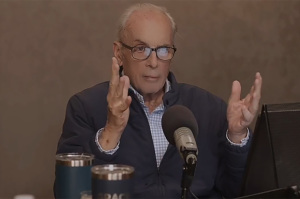The Ties that Bind: Cabled Christianity
A battle is raging between competing evangelical groups over proposed legislation which would require cable providers to offer the choice to consumers to subscribe to cable TV on a channel by channel basis. On the one side, conservative Christian and pro-family organizations like Concerned Women for America and the Parents Television Council favor the so-called “a la carte” plan, arguing that it would allow families greater control over the type of content that is piped into their homes.
On the other side, broadcasters such as the Trinity Broadcasting Network and Pat Robertson’s Christian Broadcasting Network, argue that the ability for customers to individually choose the channels to which they subscribe would undermine their ability to reach non-Christians.
Where both groups err is in assuming that the choice (or lack thereof) in cable television is primarily a political issue. Issues of government deregulation, privatization, and competition get thorny enough in the case of essential utilities, such as electricity, water, and natural gas. The voluntary and non-essential nature of cable TV immediately relegates it to an area in which governmental interventions ought to be minimal.
Secular organizations concerned with cable regulation, like Consumers for Cable Choice and Cable Choice Now!, make no bones about their commitment to relying on the coercive power of government to achieve their ends. These are essentially political lobbying groups, and more and more conservative Christian groups are conforming themselves to their image. The politicization of cable television is indicative of the contemporary evangelical preoccupation with political power, a result of which is that secular and Christian groups often cannot be distinguished by their methods and goals.
But in resorting to the “big stick” of government regulation, such groups are making an end-run around more responsible and socially-sensitive methods of achieving their ends. Under the guise of the interests of children and families and the rubric of individual choice, evangelical lobbying groups ignore the most basic choice that Christians can use to make their voices heard: the choice to turn off the TV.
Cable providers, as profit-motivated entities, are by nature interested in maximizing the satisfaction of their customers with the services they provide. If cable choice activists gave due consideration of the economic interests of cable companies, they would realize the essential power that consumers possess. Boycotts, letter-writing campaigns, and privately-organized civic coalitions can be effective means of signaling a clear consumer desire for increased channel choice.
If enough consumers made their voices heard, we wouldn’t see these misguided appeals to government enforcement. The unwillingness of cable choice activists to make use of non-coercive methods of redress speaks to their fundamental unwillingness to sacrifice and organize.
It can take time, energy, and patience to attempt to communicate with businesses and corporations. It also takes organization and resources to gather enough consumer power together to effectively make a concerted voice heard. Instead of working diligently to create such civic campaigns, it is far easier to engage in the long-established tradition of political activism through entrenched lobbying groups.
Instead of pursuing the recourse to political coercion, let’s revisit the idea of turning off the TV. Many evangelical Christians, including myself, are so infatuated with popular culture that we are unwilling to sacrifice a non-essential and potentially problematic medium like cable TV, even for the relatively brief time it might take to get the message across to cable companies.
Instead of bothering to set up channel blocking systems or more closely monitoring our children’s (or our own) viewing habits, it is easier to have someone else, like the government, take responsibility. Instead of canceling our cable subscriptions and giving the money to our churches, we are tempted to acquiesce to the seductive materialism of TV culture.
On average, evangelical Christians give about 4 percent of their income to charitable groups. In 2002, based on a set of surveys, pollster George Barna concluded that “the average congregant spends more time watching television in one day than he spends in all spiritual pursuits combined for an entire week.”
If it is true that the bad programming on cable television “far outweighs” the good, as is claimed by Lanier Swann, the director of government relations for Concerned Women for America, the responsible way to protect our families is to refrain from patronizing such a corrupted medium until such time that we can tilt the balance acceptably in favor of the good.
Imagine the time and financial resources that might be used in service of God’s kingdom if the Christian concern with cable TV were placed in proper perspective.
This article originally appeared on June 14, 2006.
_________________________________________________
Jordan J. Ballor is associate editor with the Acton Institute for the Study of Religion & Liberty in Grand Rapids, Mich.





























